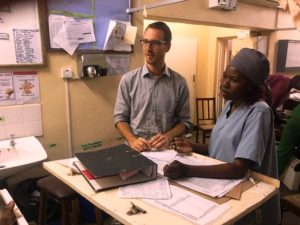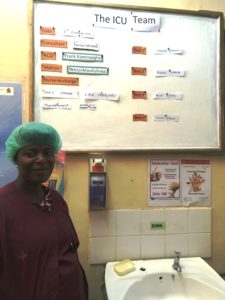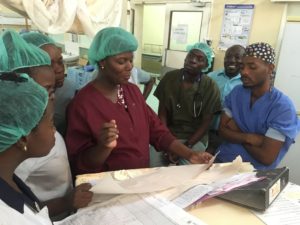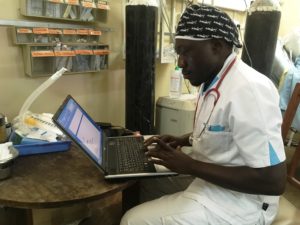120 critically ill patients and only four beds in the Intensive Care Unit. Working in the world’s poorest country, Malawi, Dr Tim Baker faces agonizing ethical dilemmas. But his dedicated colleagues at Queen Elisabeth Hospital, Blantyre, make it all worthwhile.
– Life Support Foundation works to improve critical care, anaesthesia and acute care by checklists and guidelines, improved routines, teaching sessions and research.
Why did you move with your family to Malawi?
– I am working on a research project in Malawi called SugarFACT. It is a collaboration between Karolinska Institutet and the College of Medicine in Blantyre, Malawi. We are looking at reducing deaths among critically ill children who have low levels of sugar in their blood.
– I am also working on the Intensive Care Unit in the hospital in Blantyre, and helping to improve services through Life Support Foundation. There are only four specialists in Anaesthesia and Intensive Care in the country with a population of 17 million, so at least I can be one more!
After a year there, how does it feel working with critical care?
– It is both very challenging and very rewarding. There are huge obstacles to overcome when trying to provide good quality care. The lack of resources, lack of health workers, lack of drugs and equipment. Critical care and anaesthesia have not been prioritised, and the systems in place are at times weak. But the staff are incredibly friendly and positive, there’s a big desire to improve care and to help out the really sick patients.
How does a normal day look like for you?
– When I am working clinically I start at 7.30 with a handover in the Anaesthesia department. There we hear about all the challenging cases from the previous night. It is not unusual for the department to have conducted 15 caesarean sections in one night, as well as many operations in the general theatres, and continual management of the four patients on the Intensive Care Unit (ICU). At night there are no specialists in the hospital. All the anaesthesia and intensive care is managed by Anaesthetic Clinical Officers – health workers with between 3 and 4 years training – working 24 hour shifts.
 – I then go to the ICU with the clinical officer to receive a detailed report on the patients before he/she heads home for much needed sleep. I examine and review all the patients together with the day staff, and discuss their management with other doctors in the hospital. At 10am we have a ward round, where all aspects of the patients’ care are discussed, and any particular issues are taken up. Patients who have improved are transfered out of ICU to the general wards, and often new patients are transfered in.
– I then go to the ICU with the clinical officer to receive a detailed report on the patients before he/she heads home for much needed sleep. I examine and review all the patients together with the day staff, and discuss their management with other doctors in the hospital. At 10am we have a ward round, where all aspects of the patients’ care are discussed, and any particular issues are taken up. Patients who have improved are transfered out of ICU to the general wards, and often new patients are transfered in.
– The afternoons are for patient care – often I am called to see patients in the hospital who are critically ill. It is estimated that 120 of the 1200 patients in the hospital are critically ill, and so there is a huge demand for the four ICU beds. This causes agonising ethical dilemnas, when we have to decide which patients to take to ICU and which should remain on the general wards. I also conduct formal seminars and bedside teaching on the ICU – teaching the nurses, Anaesthetic Clinical Officers and doctors in various aspects of critical care. The day ends at 4 or 5pm when the new night Anaesthetic Clinical Officer takes over the ICU.
What are the biggest challenges for people overall, and in the health area?
– Malawi is currently the world’s poorest country. There are very few resources for healthcare. The hospital relies heavily on donations, which are sporadic, and sometimes inappropriate. There is a big lack of staff, of drugs and equipment and of optimised routines and practices. Anaesthesia & Critical care has been really under-prioritised and is often the limiting factor for providing good quality care.
What are the most urgent needs in critical care in the country?
– Critical Care & Anaesthesia need to become prioritised politically so that the specialty can develop and grow. More doctors and other health workers are required in the specialty. As well as providing much needed clinical services, they could provide supervision of the care given in all hospitals in the country, and work to improve routines, practices and systems. Advocacy is urgently required to achieve this and to attract health workers into the specialty. A National Association would be a really good step, as would regular refresher training courses and exposure to Critical Care & Anaesthesia in other countries with greater resources. If systems and routines for managing critically ill patients could be improved, then many, many lives could be saved.
How do you prevent yourself as a doctor from losing hope when facing so many needs?
– It is such a rewarding place to work at! So many patients are suffering because of a lack of some basic things, and sometimes I am able to do something that can really make a difference. My colleagues here are so dedicated and so keen to build improvements that it is really enjoyable to go to work. Of course, there are some days which are very sad, or very frustrating, but there are others which remind me why I wanted to be a doctor in the first place. 
What is Life Support Foundation’s main strategy, and what has been done this far?
– Life Support Foundation works to improve critical care, anaesthesia and acute care in areas of low resources. We try to work together with local staff, and to build on systems that are already in place in order to increase capacity and improve routines that lead to better outcomes for the patients. In Malawi we have started by focusing on the ICU in Queen Elizabeth Central Hospital in Blantyre. We are introducing checklists and guidelines for emergencies that can happen on the ICU, we are working on a nursing handbook, improving staffing routines on the unit, increasing privacy for the patients and carrying out teaching sessions. We have also started some research projects that will help us understand the situation for critically ill patients in Malawi, and we hope to have a training course for nurses and clinicians in 2017.
What is your vision for the future?
I hope that Life Support Foundation can assist in helping Critical Care & Anaesthesia improve in Malawi. My vision is a thriving specialty with a larger workforce providing good quality care for critically ill patients and those requiring surgery throughout the country.
Read more about Life Support Foundations work in Malawi
You can make a difference – become a monthly donor today!
